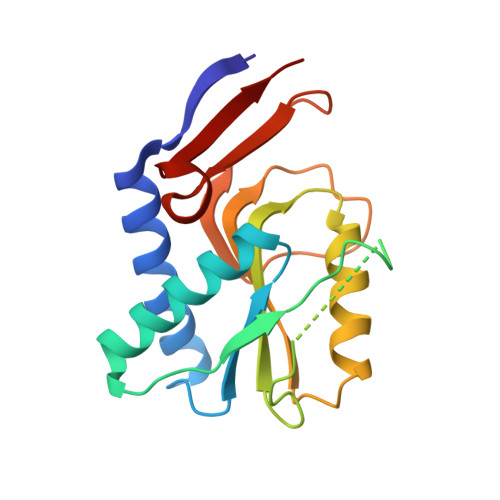Structure of the Nucleotide Complex of PyrR, the pyr Attenuation Protein from Bacillus caldolyticus, Suggests Dual Regulation by Pyrimidine and Purine Nucleotides
Chander, P., Halbig, K.M., Miller, J.K., Fields, C.J., Bonner, H.K., Grabner, G.K., Switzer, R.L., Smith, J.L.(2005) J Bacteriol 187: 1773-1782
- PubMed: 15716449
- DOI: https://doi.org/10.1128/JB.187.5.1773-1782.2005
- Primary Citation of Related Structures:
1NON, 1XZ8, 1XZN - PubMed Abstract:
PyrR is a protein that regulates the expression of genes and operons of pyrimidine nucleotide biosynthesis (pyr genes) in many bacteria. PyrR acts by binding to specific sequences on pyr mRNA and causing transcriptional attenuation when intracellular levels of uridine nucleotides are elevated. PyrR from Bacillus subtilis has been purified and extensively studied. In this work, we describe the purification to homogeneity and characterization of recombinant PyrR from the thermophile Bacillus caldolyticus and the crystal structures of unliganded PyrR and a PyrR-nucleotide complex. The B. caldolyticus pyrR gene was previously shown to restore normal regulation of the B. subtilis pyr operon in a pyrR deletion mutant. Like B. subtilis PyrR, B. caldolyticus PyrR catalyzes the uracil phosphoribosyltransferase reaction but with maximal activity at 60 degrees C. Crystal structures of B. caldolyticus PyrR reveal a dimer similar to the B. subtilis PyrR dimer and, for the first time, binding sites for nucleotides. UMP and GMP, accompanied by Mg2+, bind specifically to PyrR active sites. Nucleotide binding to PyrR is similar to other phosphoribosyltransferases, but Mg2+ binding differs. GMP binding was unexpected. The protein bound specific sequences of pyr RNA 100 to 1,000 times more tightly than B. subtilis PyrR, depending on the RNA tested and the assay method; uridine nucleotides enhanced RNA binding, but guanosine nucleotides antagonized it. The new findings of specific GMP binding and its antagonism of RNA binding suggest cross-regulation of the pyr operon by purines.
- Department of Biological Sciences, Purdue University, West Lafayette, Indiana, USA.
Organizational Affiliation:
















